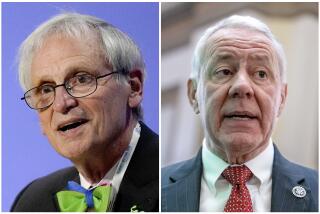A Very Short Honeymoon : Congress: Clinton will soon find that sweet-talk is cheap in Washington; others have bigger claims on congressional loyalty.
- Share via
Whoever thought of the connubial metaphor to characterize the relations between the President and Congress was a genius. The photos from the post-election get-together in Little Rock between President-elect Bill Clinton and the Democratic congressional leaders had to remind you of a wedding tableau. There were George Mitchell and Tom Foley and Dick Gephardt standing on risers behind Clinton like groomsmen in a receiving line. Adding to the wedding imagery were the toasts--the extravagant pledges of fidelity and love such as Mitchell’s vow that when Clinton and his vice president came to Congress they would find “a room filled with friends . . . people who know them personally, like and respect them, and want to work with them.” Clinton, for his part, promised to “hold out the hand of cooperation.” It was as if the constitutional relationship between the two branches, once characterized as “an invitation to struggle” was actually an invitation to snuggle.
But even while such crusty Capitol Hill regulars as Dan Rostenkowski were offering benedictions to sanctify the union and proclaim the end of the strife of divided government, the housekeeping staff had begun to tap faintly on the door to remind the newlyweds that their time in the honeymoon suite was up.
What intrudes on the warm afterglow of the election is the realization that virtually any legislation of consequence is likely to expose almost immediately the differences between the parties to this merger. Clinton is now the head of the vast, rambling extended family of 250 million Americans so diverse that only a President with his warrant from all of them can discern and advance their interests. In contrast, most members of Congress represent small, tight-knit clans with narrow and limited interests that look to their representatives in Washington for vigilant protection of their shared homely virtues.
There are states like Florida and Arizona with disproportionate numbers of retirees. There are congressional districts dominated by factory workers or farmers. There are, thanks to the application of the Voting Rights Act to the 1990 census results, more than a dozen new black and Latino members from districts super-saturated by design with minority voters to boost the number of House seats for those underrepresented groups. And for every constituency, there is a hot-button issue to be guarded like the family jewels.
On legislation of broad appeal, like the family-leave bill vetoed by President Bush in the fall, passage in the 103rd Congress is a foregone conclusion. Another easy move will be on labor-law reform, which will bond Clinton to his union supporters. But what of the issues for which Bill Clinton was elected, such as health care? This is where the crockery will begin flying.
Health care, which virtually everyone designates as a critical issue, will quickly expose the fundamental antagonism between Clinton’s desire for broad reform and the narrower interests that senators and representatives were elected to defend. One proposal making the rounds is a plan to tax employer-provided health benefits as income in order to foster a “managed” system of health care said to be favored by Clinton. Labor unions are wildly opposed to this approach, and Clinton would lose the support of members of Congress who have large blue-collar constituencies.
Capping or cutting entitlement benefits for retirees or means-testing Social Security would cause the entire Florida delegation to take a walk. A Canadian-style health plan to cut out the insurance companies costs the vote of anyone with the head office of a major insurance carrier in his or her district. Adding a dollar to the gasoline tax is an invitation to Westerners to jump ship.
These are problems that any President would face in trying to get congressional cooperation on important issues, but Clinton’s honeymoon is headed into particularly rough waters because the 103rd Congress has 110 freshmen, the largest contingent of newcomers since 1948.
Freshmen members are different from seasoned incumbents. They need to prove themselves with voters who may have elected them for no other reason than that they were challenging an incumbent. Freshmen go back to their districts more often than veterans. They assign more of their staff to offices in the state than they do to their offices on Capitol Hill. They have more town meetings to sound out public opinion and are more skittish about departing from local wisdom; even those elected on Clinton’s coattails will vote their district in a pinch.
Even at the other end of the seniority and power scale, the celebratory rhetoric should be seen in the light of the House and Senate leaders’ impulse to protect the prerequisites of their own institutions. In this connection, Clinton should know that appointing big names from the Hill to Cabinet posts is as unlikely to guarantee long-term cooperation as giving your father-in-law a job assures that your in-laws will side with you rather than your wife. Senators in particular, whether from institutional loyalty or institutional vanity, don’t want to be known as the President’s men.
Administrations that begin with exaggerated expectations of cooperation with Congress often end up more frustrated and disillusioned than those with more modest expectations. Perhaps we should swap the honeymoon metaphor, with its romantic hopefulness, for the more accurate post-nuptial reference: “a period of adjustment.”
More to Read
Get the L.A. Times Politics newsletter
Deeply reported insights into legislation, politics and policy from Sacramento, Washington and beyond. In your inbox twice per week.
You may occasionally receive promotional content from the Los Angeles Times.









